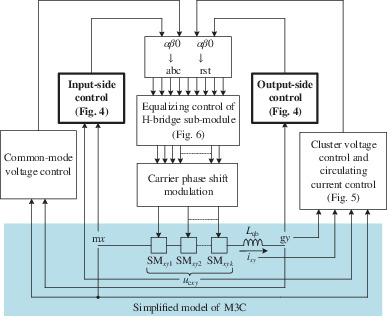当前位置:
X-MOL 学术
›
Int. Trans. Electr. Energy Syst.
›
论文详情
Our official English website, www.x-mol.net, welcomes your
feedback! (Note: you will need to create a separate account there.)
Dual‐passivity‐based control strategy of modular multilevel matrix converter
International Transactions on Electrical Energy Systems ( IF 1.9 ) Pub Date : 2020-11-12 , DOI: 10.1002/2050-7038.12692 Xinqiao Ma 1 , Qiming Cheng 1 , Yinman Cheng 2 , Xinhua Rui 3 , Juefei Zhao 4
International Transactions on Electrical Energy Systems ( IF 1.9 ) Pub Date : 2020-11-12 , DOI: 10.1002/2050-7038.12692 Xinqiao Ma 1 , Qiming Cheng 1 , Yinman Cheng 2 , Xinhua Rui 3 , Juefei Zhao 4
Affiliation

|
Complying with the trend of renewable energy power generation, the Modular Multilevel Matrix Converter (MMMC, also known as M3C) is applied to the low‐frequency alternating current (AC) transmission system to realize the AC/AC conversion from low‐frequency AC to power‐frequency AC based on the offshore wind power generation. In view of the shortcomings of traditional proportional integral (PI) control, such as slow response, more adjustment parameters and low dynamic performance, a new type of nonlinear control based on passive theory is proposed in this paper, namely passivity‐based control. It has the advantages of fast response, less adjustment parameters, and high dynamic performance, which can greatly improve the control effects of the M3C input and output sides current. Under operating conditions such as input‐side frequency changes and output power changes, the passivity‐based control strategy can still maintain a very low system impact, and the overall control effect is better. Finally, the correctness and superiority of this method are verified by simulation under different working conditions.
中文翻译:

模块化多电平矩阵变换器的基于双被动性的控制策略
顺应可再生能源发电的趋势,模块化多电平矩阵转换器(MMMC,也称为M3C)被应用于低频交流(AC)传输系统,以实现从低频AC到AC的AC / AC转换。基于海上风力发电的工频交流。针对传统比例积分(PI)控制的缺点,如响应速度慢,调整参数多,动态性能差等,本文提出了一种基于被动理论的新型非线性控制,即基于无源的控制。具有响应速度快,调整参数少,动态性能高等优点,可以大大提高M3C输入输出侧电流的控制效果。在输入侧频率变化和输出功率变化等工作条件下,基于无源性的控制策略仍然可以保持极低的系统影响,并且总体控制效果更好。最后,通过仿真在不同工作条件下验证了该方法的正确性和优越性。
更新日期:2021-01-12
中文翻译:

模块化多电平矩阵变换器的基于双被动性的控制策略
顺应可再生能源发电的趋势,模块化多电平矩阵转换器(MMMC,也称为M3C)被应用于低频交流(AC)传输系统,以实现从低频AC到AC的AC / AC转换。基于海上风力发电的工频交流。针对传统比例积分(PI)控制的缺点,如响应速度慢,调整参数多,动态性能差等,本文提出了一种基于被动理论的新型非线性控制,即基于无源的控制。具有响应速度快,调整参数少,动态性能高等优点,可以大大提高M3C输入输出侧电流的控制效果。在输入侧频率变化和输出功率变化等工作条件下,基于无源性的控制策略仍然可以保持极低的系统影响,并且总体控制效果更好。最后,通过仿真在不同工作条件下验证了该方法的正确性和优越性。









































 京公网安备 11010802027423号
京公网安备 11010802027423号